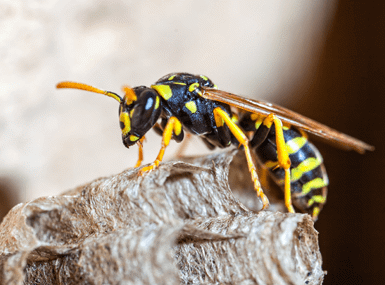It’s fall, which means the leaves are turning, pumpkin spice is everywhere, and the crisp air is refreshing. Do you know what else to expect in the fall, aggressive stinging insects?
When you are preparing your home for fall, and preventing overwintering pests inside, don’t forget about the flying and stinging insects still outside.
Types of Bees and Wasps
This fall, keep an eye out for these bees and wasps in Central Illinois and SE Iowa:
- Bald-faced hornets - The bald-faced hornet is all black with the exception of a white pattern found around their face, thorax, and abdomen. The bald-faced hornet is between ½-inch and ⅝-inch long. The queen is larger at ¾-inch in length.
- Carpenter bees - Carpenter bees are black and slightly, and they have oval bodies. The carpenter ant is between ¼-inch to 1 inch in size.
- Paper wasps - Paper wasps have thin bodies and are pinched at the waist. The paper wasp is black in color or they may be brown. The wasp has yellow and orange markings.
- Yellowjackets - Yellowjackets are social insects that live in large colonies. Yellowjackets have black and yellow markings over their bodies. The yellow jacket has a thin waist and elongated wings.
Problems Caused by Bees and Wasps in the Fall
Bees and wasps live in colonies, and wasps like the yellow jacket will stop at nothing to protect their colonies and the queen. Most bees and wasps feed on sweets and proteins. If you are picnicking in the fall, bees and wasps will crash to party to feed on your drinks and treats.
The late summer and early fall is a problem when dealing with bees and wasps because the colonies are large.
Fall is also a great time to go apple picking, to sit on the soccer field, and to head to a football game. If you are snacking on an apple, sipping a drink at the game, or working in your fall garden, you will see more bees and wasps out and about because they days are getting shorter. Bees and wasps need to feed their large colony throughout the winter. If they don’t prepare will enough for winter, the colony won’t survive. Unfortunately, you have the food they seek.
Preventing Bees and Wasps in the Fall
A few tips that will help you prevent bees and wasps in your yard this fall include :
- Keep your garbage bins away from your home
- Do not leave sugary foods or scraps outside
- Seal cracks and holes around your home’s foundation
- Put screens on vents, drains, and on your chimney
- Avoid eating outdoors, and if you do, cover food and drinks
- Call pest control professionals
Quik-Kill Pest Eliminators can inspect your home and help devise a residential pest control plan to get rid of stinging insects around your home this fall.

